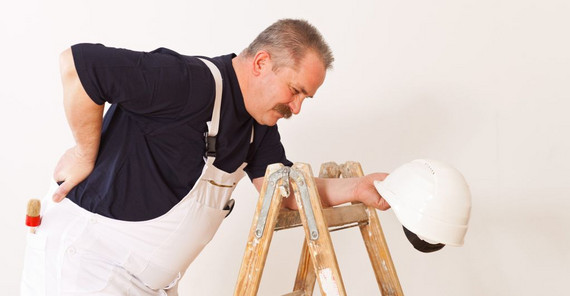Breaking your back; breathing down your neck; shouldering a burden – images of back strain pervade our language. Ignoring this too long will lead to literal breakdown. The usual diagnosis: a slipped disc. The Chair for Sociology of Sport and Health in the Research Association of Medical Rehabilitation researches how to detect risk factors for such ailments and how therapy can take this into account.
The pain comes all at once, seemingly out of the blue, but its medical back-story is actually quite long. When the back fails and literally nothing works anymore, it is often the sum of many minor and major burdens. These might have been dramatic childhood events, developmental problems during adolescence, strain during vocational training, stress at work, and worry about family or fear of losing one’s job. “Apart from medical causes, such psychosocial factors have received little attention when it comes to back problems,” says Prof. Pia-Maria Wippert from the Department of Sports and Health Sciences at the University of Potsdam. This is why she and her team are examining critical points and the accumulation of risk factors in the development and long-term course of orthopedic ailments. The project focuses on patients with either a slipped disc or spinal stenosis, which is a narrowing of the spinal canal due to age and wear.
The research network between the University of Potsdam and rehabilitation clinics in Berlin and Brandenburg has allowed researchers to speak in detail with patients at Median Clinic Hoppegarten and Median Clinic Kladow. The scientists wanted to find out which risk factors throughout one’s life contribute to the development of acute or chronic ailments. Moreover, they wanted to establish whether certain constellations of such factors allow for predictions to be made at the beginning of therapy as to how well patients might recover and be able to return to work. This would help determine before rehabilitation if a patient is especially at risk of pain “chronification” and which specific therapies are necessary to minimize this risk.
One of the major risk factors is permanent stress, which alters the release of hormones like cortisol. This, in turn, leads to changing psychological processes and facilitates inflammation, for example. “If we are able to recognize such psychosocial stress in patients’ personal history, we can then combine classical and behavioral therapies to help them adapt their lives accordingly,” Wippert says. “It sometimes takes a while to avoid falling back into old, pathogenic behavioral patterns and to actually reduce stress, setting aside time to relax and exercise, and resolving problems.” Patients need to break the negative cycle.
Wippert and her team interviewed 30 physicians, psychotherapists, and occupational therapists in a preliminary study about how they responded to their patients’ specific living and working conditions. It became clear that the time pressure is often a limiting factor. “We, therefore, want to develop a screening program that helps to record individual risk factors like stress, aversion to movement, and particular biographical events during patient intake.”
The program is based on data from the main study, which included interviews with 160 patients during intake and 6 months after their 3-week rehabilitation program at the rehab clinic. “We want to find out why some patients recover quite well and others do not,” the scientist explains. “How patients are supervised outside the clinic and physicians, therapists, and psychologists are working hand in hand is decisive.” The social environment must be right, too. Patience and support from partners and family are necessary to get back problems under control again, says Wippert.
She also contributes this holistic approach to the National Research Network for Medicine in Spine Exercise (MiSpEx), which is headed by Prof. Dr. med. Frank Mayer from the University of Potsdam. It examines the influence of physical activity on the prevention and rehabilitation of back problems. It also considers psychosocial factors, a research aspect which Wippert coordinates. The scientists want to derive recommendations for personalized diagnostics, therapy, and subsequent training programs.
The Scientist
Prof. Pia-Maria Wippert studied sports science, rehabilitation, and prevention at the Technical University of Munich, where she completed her PhD in sociology in 2002 and her postdoctoral qualification at the Chair for Sports Psychology in 2009. She earned a second degree in psychology with a focus on social processes at the distance teaching University of Hagen and gained qualification in pain-oriented psychotherapy at the International School of Management in Munich. Since 2010 she has been Professor of Sociology of Sport and Health at the University of Potsdam.
Contact
Universität Potsdam
Department Sport- und Gesundheitswissenschaften
Am Neuen Palais 10, 14469 Potsdam
wippertuuni-potsdampde
The Project
RehaLeb: Critical points and accumulation of risks in the development and in the long-term course of orthopedic diseases (Duration 2012-2014)
Funded by: Deutsche Rentenversicherung Berlin-Brandenburg
forReha
The “Research Association of Medical Rehabilitation” is a network of Berlin-Brandenburg rehabilitation clinics and the University of Potsdam that offers high-quality, patient-oriented rehabilitation research, particularly related to chronic ailments. Regular meetings offer a forum for a scientific exchange between clinics as well as different disciplines and professions within the network with a focus on transferring knowledge of scientific findings into clinical practice.
Text: Antje Horn-Conrad, Online-Editing: Agnes Bressa
Contact Us: onlineredaktionuuni-potsdampde

